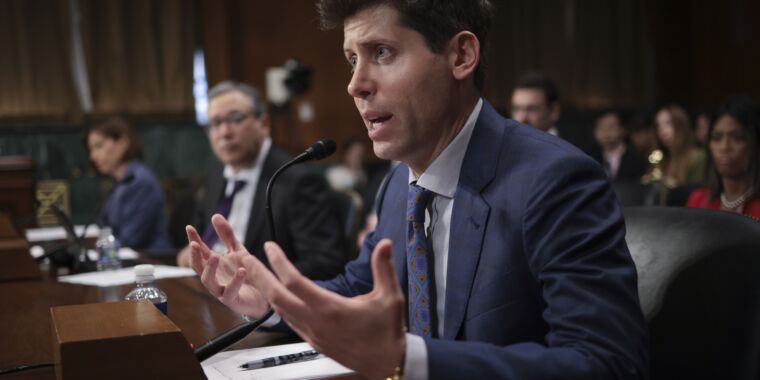FTC Launches Investigation Into OpenAI And ChatGPT: A Deep Dive

Table of Contents
The FTC's Concerns Regarding ChatGPT and Data Privacy
The FTC's investigation into OpenAI centers around potential violations of Section 5 of the FTC Act, which prohibits unfair or deceptive acts or practices. The Commission is particularly focused on ChatGPT's data handling practices and their potential impact on consumer privacy. The scale and nature of the data collected to train such a sophisticated large language model raise serious questions about data protection.
Specific privacy concerns highlighted by the FTC likely include:
- Collection and use of personal data for training the model: ChatGPT's training involves vast amounts of text and code from the internet, potentially including personally identifiable information (PII) without explicit consent. This raises concerns about the extent of data scraping and its ethical implications.
- Potential for data breaches and unauthorized access to sensitive information: The sheer volume of data processed by ChatGPT creates a potentially large attack surface, increasing the risk of data breaches and unauthorized access to sensitive information. Robust security measures are crucial to mitigate such risks.
- Lack of transparency regarding data handling practices: Users need clear and accessible information about how their data is collected, used, and protected. Opacity in this area is a major concern for regulators and consumers alike. Understanding the AI data privacy implications is critical.
- Difficulties in exercising data subject rights (e.g., right to erasure): Given the nature of the model's training, it may be technically difficult or impossible for users to exercise their rights to access, correct, or delete their data. This raises concerns about consumer privacy and compliance with data protection regulations.
This investigation has significant implications not only for OpenAI but also for the broader AI industry, highlighting the need for robust data protection frameworks and increased transparency in the development and deployment of AI technologies. The focus on data protection within AI regulation is now paramount.
ChatGPT's Potential for Misinformation and Bias
Another key area of the FTC's investigation focuses on ChatGPT's potential to generate false or misleading information, and to perpetuate existing societal biases. The model, trained on massive datasets, can inadvertently amplify biases present in that data, leading to discriminatory or unfair outcomes. Furthermore, its ability to generate realistic-sounding text makes it a potential tool for the spread of disinformation and propaganda.
Specific concerns include:
- The spread of disinformation and propaganda: ChatGPT's ability to generate convincing but false narratives poses a significant threat to public trust and the integrity of information online. This concern extends to the wider issue of AI bias in information dissemination.
- Amplification of existing societal biases present in the training data: The training data used to develop ChatGPT may contain biases related to gender, race, religion, or other sensitive attributes, which can be reflected in the model's output. Understanding and mitigating AI bias is crucial.
- Lack of mechanisms to verify the accuracy of generated content: Currently, there are limited built-in mechanisms to ensure the accuracy of the information generated by ChatGPT. This lack of verification increases the risk of misinformation and deepfakes.
Mitigating these risks requires significant advancements in AI safety and responsible AI development. The FTC investigation underscores the need for mechanisms to detect and flag potentially false or biased information generated by AI systems.
OpenAI's Compliance and Response to the FTC Investigation
OpenAI has acknowledged the FTC investigation and released a statement expressing its commitment to addressing the concerns raised. The company's response likely involves a multi-pronged approach aimed at enhancing its compliance posture and improving its AI systems.
Potential actions OpenAI may take include:
- Enhancement of data privacy measures and security protocols: Strengthening data security and implementing more robust access controls are paramount to preventing data breaches and protecting user privacy.
- Development of more robust fact-checking and verification mechanisms: Integrating mechanisms to detect and flag potentially false or misleading information is crucial to mitigating the risks associated with misinformation and deepfakes.
- Increased transparency regarding data handling practices and model limitations: OpenAI needs to provide greater clarity on its data collection, use, and protection practices, as well as clearly communicate the limitations and potential biases of its models.
The legal and reputational implications for OpenAI are significant. This investigation will shape its future development and potentially serve as a benchmark for AI accountability for other companies. The OpenAI response and subsequent actions will be closely scrutinized by regulators and the public alike. This case sets a precedent for FTC regulations concerning AI.
The Broader Implications of the FTC Investigation for the AI Industry
The FTC investigation into OpenAI and ChatGPT has far-reaching implications for the entire AI industry. It signals increased regulatory scrutiny and potentially paves the way for stricter regulations regarding AI development and deployment. This focus on AI ethics and AI legislation is essential.
The investigation highlights the need for:
- Increased scrutiny and regulation of AI technologies: This includes clearer guidelines on data privacy, bias mitigation, and content moderation. Developing appropriate AI legislation is crucial.
- Responsible AI development and deployment: A focus on ethical considerations, transparency, and accountability is paramount for the future of AI.
This landmark investigation emphasizes the growing importance of responsible AI development and the need for a comprehensive regulatory framework to address the potential risks and challenges posed by advanced AI technologies. The emphasis on AI ethics and AI accountability is no longer optional.
Conclusion
The FTC's investigation into OpenAI and ChatGPT raises critical concerns about data privacy, misinformation, and the broader ethical implications of AI. This landmark case sets a crucial precedent for future oversight of AI technologies, emphasizing the need for responsible innovation and robust regulatory frameworks. The investigation highlights the urgent need for increased transparency, accountability, and stronger mechanisms to mitigate the risks associated with AI, particularly regarding AI bias and the potential for harm. The implications extend far beyond OpenAI, affecting the entire AI industry.
Call to Action: Stay informed about the ongoing FTC investigation into OpenAI and ChatGPT and follow developments in AI regulation to ensure responsible innovation and protect consumer rights. Learn more about the FTC's investigation into OpenAI and ChatGPT and the evolving landscape of AI accountability.

Featured Posts
-
 Giants Padres Game Prediction Padres Outright Victory Or A Close 1 Run Loss
May 16, 2025
Giants Padres Game Prediction Padres Outright Victory Or A Close 1 Run Loss
May 16, 2025 -
 Sigue El Partido Venezia Napoles En Directo Online
May 16, 2025
Sigue El Partido Venezia Napoles En Directo Online
May 16, 2025 -
 Another Uk Outing Tom Cruise And Ana De Armas Relationship Status Remains Unclear
May 16, 2025
Another Uk Outing Tom Cruise And Ana De Armas Relationship Status Remains Unclear
May 16, 2025 -
 Jimmy Butlers Warriors Connection A Recruitment Challenge For The Miami Heat
May 16, 2025
Jimmy Butlers Warriors Connection A Recruitment Challenge For The Miami Heat
May 16, 2025 -
 Ovechkin At 893 A Historic Goal And The Race For The Nhl Scoring Title
May 16, 2025
Ovechkin At 893 A Historic Goal And The Race For The Nhl Scoring Title
May 16, 2025
